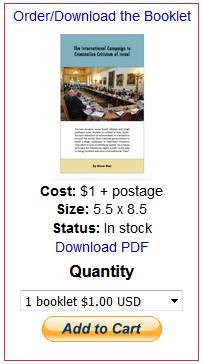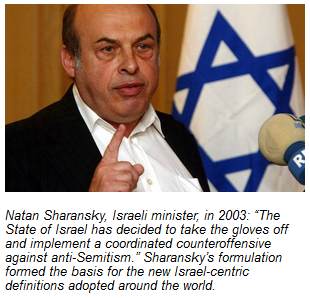International campaign is criminalizing criticism of Israel as ‘antisemitism’
By Alison Weir (of If Americans Knew) [original with links here]
 As the world has witnessed the oppression and ethnic cleansing of Palestinians, many people have risen in protest. In response, the Israeli government and certain of its advocates have conducted a campaign to crack down on this activism, running roughshod over civil liberties (and the English language) in the process.
As the world has witnessed the oppression and ethnic cleansing of Palestinians, many people have risen in protest. In response, the Israeli government and certain of its advocates have conducted a campaign to crack down on this activism, running roughshod over civil liberties (and the English language) in the process.
The mechanism of this crackdown is the redefinition of “antisemitism”[1] to include criticism of Israel, and the insertion of this definition into the bodies of law of various countries.
Where most people would consider “antisemitism” to mean bigotry against Jewish people (and rightly consider it abhorrent), for two decades a campaign has been underway to replace that definition with an Israel-centric definition. That definition can then be used to block speech and activism in support of Palestinian human rights as “hate.” Various groups are applying this definition in law enforcement evaluations of possible crimes.
Proponents of this Israel-centric definition have promoted it step by step in various arenas, from the U.S. State Department and European governments to local governments around the U.S. and universities.
While this effort has taken place over the last two decades, it is snowballing rapidly at this time. The definition is increasingly being used to curtail free speech and academic freedom, as well as political activism.
Furthermore, such politicizing of an important word may reduce its effectiveness when real antisemitism occurs, doing a disservice to victims of true bigotry.
As of this writing, the U.S. Congress has endorsed the distorted definition, the governments of the UK and Austria have officially adopted it (in December and April, respectively), various U.S. State legislatures are considering it, and numerous universities are using it to delineate permissible discourse. Many representatives and heads of other states around the world have embraced the new meaning, even if they have yet to officially implement it.
This article will examine the often interconnected, incremental actions that got us where we are, the current state of affairs, and the public relations and lobbying efforts that are promoting this twisting of the definition of “antisemitism” — often under cover of misleadingly named “anti-racism” movements.
Claims of “Antisemitism” Used to Silence Support for Palestinians
For many years, numerous respected organizations have documented Israeli violations of Palestinian human rights, including killing of Palestinian civilians, abuse of Palestinian children, torture of Palestinian prisoners, confiscation of Palestinian land, and other cases of systematic violence and oppression. Detailed reports have been compiled by Defense for Children International, the International Red Cross, Amnesty International, Foreign Service Journal, Physicians for Human rights, Christian Aid, Human Rights Watch, the National Lawyers Guild, Israel’s Public Committee Against Torture, Israel’s B’Tselem and others.
Israel long claimed that its 1948 creation was on “a land without a people for a people without a land,” and many people may still believe this founding myth. The fact is, however, that the land was originally inhabited by an indigenous population that was approximately 80 percent Muslim, 15 percent Christian, and a little under 5 percent Jewish. The Jewish State of Israel was created through the ejection of approximately three-quarters of a million people.
Over the decades since Israel’s founding in 1948, accusations of antisemitism have been leveled against many people who criticized Israeli actions. Indeed, the accusation was used effectively to silence very prominent critics.[2]
However, for most of that time, the meaning of the term itself was not in question. The standard definition was, in Google’s terms, “hostility to or prejudice against Jews.”[3] Around the turn of this century, though, certain advocates began promoting official and even legal definitions of antisemitism that included various kinds of criticism of Israel.
Conflating Criticism of Israel with Antisemitism
Unsurprisingly, the new definitions appear to have originated from within the Israeli government, or at least with an Israeli government official.
 The definitions adhere to a pattern set by a man named Natan Sharansky, who was Israel’s Minister for Jerusalem and Diaspora Affairs and chair of the Jewish Agency for Israel. Sharansky founded a Global Forum against Anti-Semitism in 2003, stating: “The State of Israel has decided to take the gloves off and implement a coordinated counteroffensive against anti-Semitism.”
The definitions adhere to a pattern set by a man named Natan Sharansky, who was Israel’s Minister for Jerusalem and Diaspora Affairs and chair of the Jewish Agency for Israel. Sharansky founded a Global Forum against Anti-Semitism in 2003, stating: “The State of Israel has decided to take the gloves off and implement a coordinated counteroffensive against anti-Semitism.”
But Sharansky apparently didn’t mean a counteroffensive against just anti-Jewish bigotry, but an offensive against criticism of Israel. The following year he wrote a position paper that declared: “Whereas classical anti-Semitism is aimed at the Jewish people or the Jewish religion, ‘new anti-Semitism’ is aimed at the Jewish state.”
Sharansky’s paper laid out what he called the “3-D Test of Anti-Semitism.” Sharansky applied the term “antisemitic” to criticism of Israel in three cases. First, he argued that statements that “demonize” Israel are antisemitic — by being, in his mind, unfairly harsh. (Some of those allegedly guilty of “demonizing” Israel are Jimmy Carter, Desmond Tutu, Alice Walker, Human Rights Watch, Swedish Prime Minister Olof Palme, French President François Mitterrand, and others.)
Second, Sharansky declared that it’s antisemitic to apply a “double standard” to Israel — in other words, to criticize Israel for actions that other states may also take. However, if one could never criticize, protest or boycott abuses without calling out every single other similar abuse, no one would ever be able to exercise political dissent at all.
Finally, Sharansky said it’s antisemitic to “delegitimize” Israel, or dispute its “right to exist” (a standard Israeli talking point for many years). In fact, insisting Israel has the “right” to exist amounts to saying it had the right to expel Muslim and Christian Palestinians in order to found a religiously exclusive state. (See “What ‘Israel’s right to exist’ means to Palestinians,” by John Whitbeck, published in the i.)[4]
Sharansky’s outline provided the pattern for a European agency to create a new definition of antisemitism the next year, 2005 — a definition that would then be adopted by a succession of organizations and governments, including the U.S. State Department.
… Full fascinatingly scary original column here.
This post has been read 1327 times!

